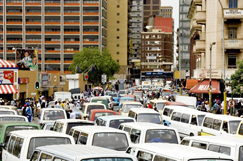SA now making, assembling 50% of taxis
19 March 2013
South Africa has made significant progress in localizing the manufacture and
assembly of minibus taxis, Economic Development Minister Ebrahim Patel said on the
weekend.
"Some 12 months ago, none of the taxis on our roads were assembled in South
Africa. Today about 50 percent of all taxis that are purchased are made or
assembled here in South Africa, and we're moving towards the target of localizing
two-thirds of assembly in the taxi industry by 2015."
The government is leading a campaign to promote the local procurement of supplies
across all industries in order to boost the economy's capacity to create jobs.
Patel said the Industrial Development Corporation (IDC) had been mandated to
develop a national localization strategy to guide all spheres of government.
He said the labour-absorbing capacity of local manufacturing industries had to be
boosted to stimulate job creation and economic growth, adding that a
strong local
manufacturing sector would have a positive impact on South Africa's balance of
payments.
"We are working in partnership with a major manufacturer, Toyota, who has
expanded the factory in eThekwini, as well as a partnership with the IDC and a
Chinese manufacturer called the Beijing Automotive Works that has started a factory
in Gauteng.
These companies had already employed 220 people to assemble taxis locally, with
the number set to increase significantly by 2015, Patel said.
In October 2011, the government, business, labour and community-based
organisations signed a Local Procurement Accord committing the parties to work
together to increase local procurement as part of South Africa's plans to create five-
million jobs over the next decade.
And in December, the government put the buying power of the state firmly behind
local manufacturers, with new amendments to the the Preferential Procurement
Policy Framework Act
allowing the government to name sectors and products that
require a minimum level of local content to qualify for state procurement.
Bus manufacturing was among the first batch of sectors designated for local
procurement under the amended law, resulting in the local sourcing of 80 percent of
all inputs and supplies in the manufacturing of bus bodies for the rapid public
transport systems in Pretoria, Cape Town and Johannesburg.
Other products designated in the first batch included power pylons, rolling stock, TV
set-top boxes, clothing, canned vegetables, footwear and leather products.
In January, the Department of Trade and Industry announced a second batch of
designated products, namely electrical valves, manual and pneumatic actuators,
electrical and telecommunication cables, and components of solar water heaters.
Source: SAnews.gov.za
 Minibus taxis in Johannesburg's city centre (Photo: Chris Kirchhoff, MediaClubSouthAfrica)
Minibus taxis in Johannesburg's city centre (Photo: Chris Kirchhoff, MediaClubSouthAfrica)




